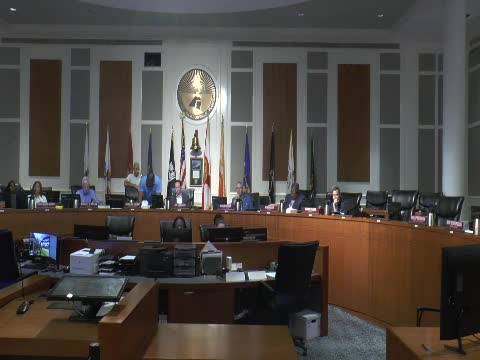Committee debates requiring city employees to report suspected fraud, waste and abuse to Inspector General
Get AI-powered insights, summaries, and transcripts
Subscribe
Summary
The Neighborhoods, Community Services, Public Health and Safety Committee discussed a proposal to require all city employees to report suspected fraud, waste and abuse to the Office of the Inspector General.
The Neighborhoods, Community Services, Public Health and Safety Committee discussed a proposal to require all city employees to report suspected fraud, waste and abuse to the Office of the Inspector General during its meeting.
Committee members said the proposal would expand reporting beyond elected officials to include frontline and administrative staff who encounter potential misconduct in daily work. Council Member Miller, a sponsor of the measure, said the change is meant to “encourage people to report” and to reduce a current disparity that limits reporting requirements to elected officials.
Brandon King, an investigator with the Office of the Inspector General, told the committee the policy mirrors practices in other inspector general offices and is intended as a broad tool for prevention and trend analysis. “This is a pretty standard procedure,” King said, adding the office plans an educational outreach so employees understand what constitutes reportable fraud and how to report it.
Members raised concerns about whether codifying the requirement would amount to legislating personal accountability and whether staff could face retaliation. King and several council members said federal and local whistleblower protections apply; King noted the inspector general’s office is legally required to protect the confidentiality of whistleblowers and that it would not disclose identities without a signed waiver.
Council members also questioned practical enforcement if employees fail to report. Committee members were told failure to report would generally be treated as an administrative matter for the employee’s agency; criminal referrals would be made only when investigations uncovered evidence warranting prosecution and would be forwarded to the state attorney as appropriate.
The committee heard that the inspector general’s office expects reporting to increase once staff receive training explaining what to look for and how to file reports. King said the office lacks a precise baseline for current reporting because previous coverage was narrower, but that internal investigations have discovered instances that had not been reported to the IG.
Auditors in the room proposed a targeted amendment to exempt the auditor’s office from immediate reporting while an audit is in progress, with a requirement that the auditor forward any reportable findings to the IG after the audit is complete. The committee discussed that amendment but did not record a final roll-call vote on the overall bill during the excerpted discussion.
The conversation included repeated emphasis on training and education as a precursor to enforcement, and members asked the administration to work with the IG’s office to design that program. Several council members said they would support the measure once the educational and implementation details are clarified.
The record shows sustained committee debate, requests for clarifying language about training and exemptions during audits, and assurances from the inspector general’s office about confidentiality and the intention to use the requirement as both a reporting and educational tool.
